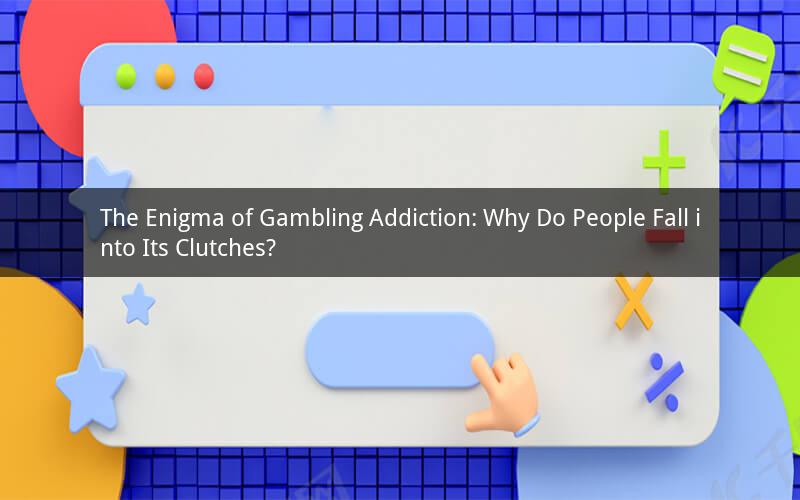
Gambling addiction, a term that encompasses a complex psychological condition, has become a prevalent issue in today's society. Despite the risks involved, countless individuals succumb to the allure of gambling and find themselves trapped in a cycle of addiction. This article aims to delve into the reasons behind why people develop a gambling addiction, exploring various factors that contribute to its development.
1. The Thrill of Risk and Reward
One of the primary reasons why people become addicted to gambling is the thrill of taking risks and the anticipation of potential rewards. The allure of winning big money and the adrenaline rush associated with it can be irresistible for some individuals. This desire to experience the thrill of winning often leads them to engage in gambling activities, ultimately resulting in addiction.
2. Emotional Distress and Escape
Gambling addiction often arises from underlying emotional distress. Individuals who experience anxiety, depression, or other mental health issues may turn to gambling as a form of escape. The temporary relief and sense of euphoria provided by gambling can serve as a coping mechanism for dealing with emotional pain. However, this temporary relief often leads to a more profound addiction as individuals seek to recreate those feelings repeatedly.
3. Social and Cultural Influences
Social and cultural factors play a significant role in the development of gambling addiction. In societies where gambling is widely accepted and even encouraged, individuals may be more susceptible to developing an addiction. Additionally, the portrayal of gambling in media, such as movies and television shows, can perpetuate the idea that gambling is a glamorous and exciting activity. This portrayal can influence individuals to try gambling, leading to addiction.
4. Brain Chemistry and Dopamine
The brain's reward system plays a crucial role in the development of gambling addiction. When individuals engage in gambling activities, the brain releases dopamine, a neurotransmitter associated with pleasure and reward. The repetitive release of dopamine reinforces the behavior, making individuals crave more of the same experience. Over time, this reinforces the addictive cycle, making it challenging for individuals to break free from their gambling addiction.
5. Financial Strain and Debt
Gambling addiction often leads to significant financial strain and debt. The desire to recoup losses or continue chasing the thrill of winning can drive individuals to make irrational decisions, leading to excessive gambling. The resulting financial difficulties can exacerbate the addiction, as individuals may feel compelled to gamble even more in an attempt to regain control over their finances.
Now, let's address five questions related to why people have a gambling addiction:
Question 1: Can gambling addiction be cured?
Answer: While there is no one-size-fits-all solution, gambling addiction can be effectively treated. Treatment options may include therapy, counseling, support groups, and medication. The key is for individuals to seek help and commit to the treatment process.
Question 2: Why do some people become addicted to gambling while others do not?
Answer: Several factors contribute to the development of gambling addiction. These factors include genetics, personality traits, environmental influences, and underlying mental health issues. Some individuals may be more susceptible to addiction due to a combination of these factors.
Question 3: Can gambling addiction be prevented?
Answer: While it is challenging to completely prevent gambling addiction, certain measures can be taken to reduce the risk. These measures include educating individuals about the dangers of gambling, promoting responsible gambling practices, and addressing underlying mental health issues.
Question 4: How does gambling addiction affect family and friends?
Answer: Gambling addiction can have severe consequences for family and friends. It can lead to strained relationships, financial strain, and emotional turmoil. Family members and friends may also be affected by the individual's addiction, experiencing feelings of guilt, frustration, and helplessness.
Question 5: Are there any effective treatment programs for gambling addiction?
Answer: Yes, there are several effective treatment programs for gambling addiction. These programs often include a combination of therapy, counseling, support groups, and medication. Treatment programs may vary depending on the individual's specific needs and circumstances.
In conclusion, the reasons behind why people develop a gambling addiction are multifaceted. Understanding these reasons can help individuals seek appropriate treatment and support, as well as promote awareness and prevention efforts within society. It is crucial to recognize that gambling addiction is a serious condition that requires attention and intervention.